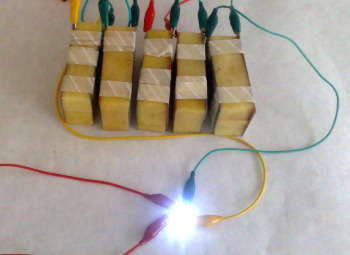- AWAKE: The Life of Yogananda
- How Wolves Change Rivers
- The Gerson Therapy - Curing Cancer Naturally for 60 years
- Jim Carey is a Truly Awakened Soul - Speech at Maharishi U.
- Healing and Travel Protection with Archangel Raphael
- Archangels and Ascended Masters
- Ancient Secret of the Fountain of Youth
- JFK Speech April 27, 1961 - We are opposed by a monolithic, ruthless conspiracy
What a great way to provide lighting to areas where electricity is unavailable and potatoes are in abundance or easily grown.

Source:
The scientists from the Hebrew University of Jerusalem (HUJ) have discovered that potatoes can be used as organic batteries, providing a cheap, immediate and easy to use source of green power to parts of the world that currently lack electrical infrastructure.
It’s a development that could improve the quality of life of 32 percent of the developing non-OECD populations – some 1.8 billion people.
The new organic electric battery can provide the power source to meet significant, low-power needs such as lighting, telecommunication, and information transfer.
“A person with two left hands could do it,” Prof. Haim D. Rabinowitch of the university’s Faculty of Agriculture, Food and Environment tells ISRAEL21c. “It’s like making a sandwich of two metal sheets and a piece of cooked potato in between.”
Humble potato is the top choice
Rabinowitch, research student Alex Golberg from the university’s School of Computer Science and Engineering, together with Prof. Boris Rubinsky at the University of California at Berkeley, have been studying the electrolytic process in living matter for use in various applications, including the generation of electric energy for self-powered implanted medical electronic devices.
The professor explains that all organic tissue can serve in the construction of such a cell and generate electricity. “It is possible to replace the potato with liver tissue (for example) or any other tissue in our body for self-powered implanted medical electronic devices. Think of a pacemaker that gets its power by contact with the heart tissue or muscles. Such a pacemaker does not require a battery and never stops – as long as the tissue is there.”
Practically all organic matter can be used to generate electrical current through electrolysis, but some produce electricity more efficiently than others do. The humble potato was selected for the study because it is widely available almost all year-round, is grown in 130 countries over a wide range of climates (in 2007 alone 325 million tons of potatoes were produced), it isn’t messy, stores well for months and is cheap to buy.
In their research, the scientists found a new way to construct an efficient battery using zinc and copper electrodes and a slice of potato. They also discovered that the simple action of boiling a potato prior to use in electrolysis increases electric power up to 10 fold over an untreated potato, and enables the battery to work for days, and even weeks.
Initially, the researchers believed that the energy stored in the potato tuber (which is 15 to 22% starch) was the main source of power, but they then saw that output was low. Hypothesizing that the resistance of the tissue was reducing the output efficiency, they applied a technique called irreversible electroporation which damages membranes but not a cells’ other components or molecules.